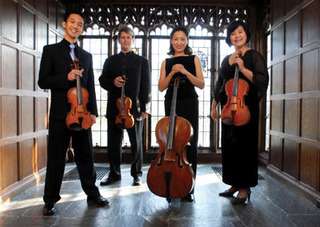|
Back
A dazzling, daunting achievement Toronto
Walter Hall
08/06/2015 -
Bela Bartók: The Complete String Quartets
The Borromeo String Quartet: Nicholas Kitchen, Kristopher Tong (violin), Mai Motobuchi (viola), Yeesun Kim (cello)

The Borromeo String Quartet (Courtesy of Toronto Summer Music)
Imagine a seriously daunting program attracting a near-capacity audience on an idyllic evening. Toronto Summer Music provides a merciful oasis of music amidst the city's habitual summer torpor.
The Borromeo Quartet was formed in 1989 by a group of young players at the Curtis Institute and are now in resident at the New England Conservatory. Husband and wife Nicholas Kitchen (violin) and Yeesun Kim (cello) are founding members. Violist Mai Motobuchi joined in 2000, and violinist Kristopher Tong in 2006. The most striking feature of the evening was the sustained unity of the players. The fact that they are superb, well-seasoned performers is the key factor here, but also their use of laptop screens on their music stands which display the full score to each player. The pages are "turned" by tapping a foot pedal. This makes each player hyper-aware of his/her colleagues' parts - not that they kept their eyes glued to the score, there was also a lot of eye contact and body language, all appropriate in a program of music containing a continuous tug of war in tempo and intensity.
The second striking feature was how vividly the program demonstrated that Bartók was so very firmly always Bartók. The works span most of his career, from age 28 in 1909 to age 58. The key description is "sinewy"; lyrical warmth appears, notably in the Third and Sixth quartets, and the final dance of the Third quartet can almost be described as "fun". But my notes most frequently contain the words hard-driving, muscular, melancholic, exuberant, savage, bleak, hectic, plaintive, and anguished.
If the First quartet shows a composer who has found his voice and says what he has to say but then keeps on saying it, the subsequent works avoid this pitfall, and in fact the two longest, the Fourth and Fifth, each with five movements, are also the most terse. Bartók can be wryly amusing - even the Sixth quartet, composed as World War II began and with each movement labelled Mesto (mournful), contains a dizzy little interlude where he seems to be saying "See - I could have composed jolly operettas, but had more important things to do."
With two brief intermissions (plus a few moments to replace a broken string), this concert was almost three and one-half hours long. A few in the audience failed to go the length and I can sympathize. As enthralling as I found it I wouldn't want to repeat the experience. Next time: spread the works over two evenings, and throw in some of the alternative movements Bartók chose not to include in these works that constitute a major representative achievement of a turbulent century.
I can't help but be a firm fan of the Borromeo Quartet. And I am sure the use of laptop music stands will soon be widely adopted.
Michael Johnson
|